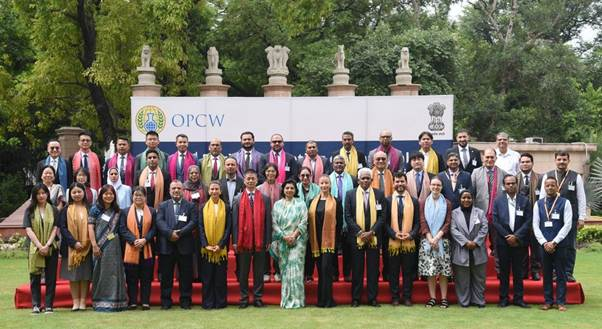India Hosts 23rd OPCW Regional Meet, Wins Praise for Chemical Safety Leadership
India, as an original signatory to the CWC, continues to demonstrate global leadership in chemical disarmament through policy, mentorship, and industrial engagement.

- Country:
- India
The 23rd Regional Meeting of National Authorities of States Parties in Asia, organized by the Organisation for the Prohibition of Chemical Weapons (OPCW) and hosted by India’s National Authority for Chemical Weapons Convention (NACWC), commenced on July 1st at Vanijya Bhawan, New Delhi. The meeting has convened a distinguished gathering of 38 delegates from 24 Asian countries, alongside OPCW officials and experts from the United Nations Regional Centre for Peace and Disarmament in Asia and the Pacific (UNRCPD).
This annual event marks a cornerstone in fostering regional cooperation and dialogue for the implementation of the Chemical Weapons Convention (CWC), a treaty that came into force in 1997 and has 193 Member States committed to eliminating chemical weapons permanently and verifiably.
India’s Leadership in Chemical Disarmament
India, as an original signatory to the CWC, continues to demonstrate global leadership in chemical disarmament through policy, mentorship, and industrial engagement. The NACWC, which operates under the Cabinet Secretariat, Government of India, is the designated national authority tasked with overseeing and enforcing CWC obligations within the country.
In 2024, NACWC successfully mentored the Kenya National Authority under the OPCW Mentorship/Partnership Programme, enhancing Kenya’s implementation capacity and deepening South-South cooperation under the OPCW framework.
Further cementing India’s role, the Indian Chemical Council (ICC), the country’s oldest chemical industry association, was co-recipient of the OPCW-The Hague Award 2024 — an unprecedented recognition for a chemical industry body. This marked the first time globally that an industry association received the prestigious honour for promoting chemical safety, security, and Convention compliance.
Participating Countries and Stakeholders
The meeting welcomed delegates from a broad spectrum of Asia-Pacific countries, including: Australia, Bangladesh, Bhutan, China, Cambodia, Iraq, India, Indonesia, Japan, Jordan, Kyrgyzstan, Kuwait, Lebanon, Malaysia, Maldives, Myanmar, Oman, the Philippines, the Republic of Korea, Singapore, Sri Lanka, Thailand, United Arab Emirates, and Vietnam.
Key stakeholders from India in attendance included senior officials from the Ministry of External Affairs, Cabinet Secretariat, and representatives from industry and academia.
Key Themes and Discussions
Over the course of three days, the Regional Meeting features plenary sessions, breakout groups, and high-level exchanges on a variety of themes vital to strengthening the global chemical weapons disarmament regime.
Legislative and Regulatory Frameworks
Delegates explored national legislation, regulatory enforcement, and policy integration for ensuring full compliance with CWC provisions. Discussions also focused on overcoming legislative gaps and building institutional frameworks in newer or developing states.
Chemical Safety and Security
This session drew considerable attention, as participants shared country-specific best practices in ensuring chemical plant safety, storage protocols, transportation, and emergency response systems. India’s own Responsible Care® initiatives and industry codes were showcased.
Role of Stakeholders and Industry
The meeting underscored the importance of private-sector participation in CWC implementation. The Indian Chemical Council demonstrated how industry-led training, audit systems, and reporting mechanisms can supplement state obligations. Other countries expressed interest in replicating India’s outreach model.
Emerging Technologies and Artificial Intelligence
Cutting-edge discussions were held on how AI technologies can enhance threat detection, monitoring, training, and compliance in the chemical sector. Experts addressed both opportunities and ethical concerns, calling for guidelines on responsible AI use in disarmament contexts.
CWC and UNSC Resolution 1540 Synergies
The OPCW provided updates on cooperation with UN Security Council Resolution 1540, which aims to prevent the proliferation of WMDs to non-state actors. Delegates discussed dual-use chemicals, supply chain security, and preventing the misuse of scientific advancements.
A Platform for Cooperation and Dialogue
Participants praised the Regional Meeting as a platform for transparent dialogue, knowledge exchange, and peer-to-peer learning. Bilateral meetings were held on the sidelines to discuss regional coordination, technical assistance, and future mentorship partnerships.
India was lauded for its continued commitment to global peace and disarmament, particularly for hosting this strategic gathering and taking an active role in advancing the goals of the OPCW.
In his welcome note, a senior official from the OPCW emphasized:
“India has consistently demonstrated exemplary commitment to the CWC and has emerged as a regional and global leader in chemical weapons disarmament, safety, and capacity-building.”
Looking Ahead
The three-day meeting, concluding on July 3, is expected to:
-
Boost technical cooperation and policy alignment among Asian States Parties
-
Strengthen regional networks of National Authorities
-
Promote industry-government collaboration for enhanced safety
-
Encourage the integration of emerging technologies responsibly
-
Inspire new mentorship partnerships to build global implementation capacity
The event has reaffirmed Asia’s commitment to a world free of chemical weapons and showcased how multilateralism, innovation, and regional solidarity can together ensure peace and chemical safety for future generations.










